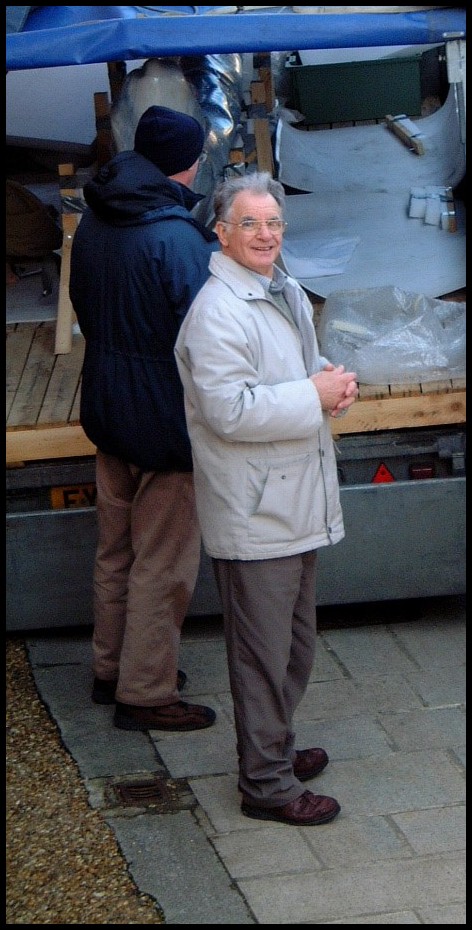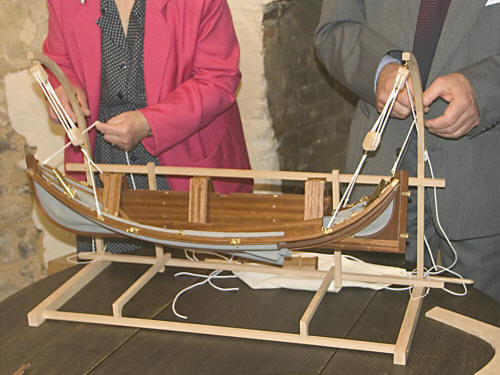|
  |
|
Page 2 |
Newsletter 129 Summer 2020 © Hampshire Mills Group |
|
|
|

Jeff
Hawksley died on March 25 from pneumonia, but not
from covid-19. He was in his mid-80s and he and his
wife Mavis, to whom we extend our condolences, had
been HMG members for many years. They were also
prominent members of Lower Test Valley
Archaeological Society (LTVAS). The funeral was on
April 6.
He was a
regular contributor to Mill News, the quarterly
magazine of SPAB Mills Section, and published a lot
of other articles for a variety of organisations,
including the HMG Newsletter. One of these A Flax
Mill in Romsey is reprinted in this newsletter
(thanks to former editor Sheila Viner for supplying
the source files) and also An Unusual Wheel for
Lifting Water in France (Newsletter 96, Spring
2012).
|
|
Phoebe Merrick of LTVAS writes:
Early in
March, we were treated to a fascinating talk by Dr
Jeff Hawksley about flax mills in Romsey. Sadly
that is the last talk we shall ever have from him
because a fortnight later he passed away with
pneumonia.
Jeff had
been a marine engineer and then became a lecturer at
Southampton Tech, as Solent University was then
known, and a visiting lecturer at the University of
Southampton. He lived in Romsey for many years and
became interested in aspects of the town’s history.
His
model-making skills were of the highest order.
Working with the late architect, Don Hargreaves, he
made a scale model of the frame of King John’s
House, that could be easily dismantled for
demonstration purposes.
|
|
Later on he
became very interested in Berthon boats and spent
many hours tracking down the patented plans of them.
Subsequently he made a model of a Berthon boat
which is in King John’s House. He also made a
simpler model to demonstrate the basic principles of
how Berthon boats folded and unfolded which is much
appreciated when talks about Berthon are given.
 |
|
He
was one of the leading lights of our mills project
that led to the best book we have ever produced,
Romsey’s Mills and Waterways. For weeks our
workshops were full of discussions about the
horse-power that given streams might generate,
amongst other technical matters, and his plan of
Romsey’s waterways has become a classic. His wife,
Mavis, to whom our sympathies go, played a
significant role in this research as she interviewed
a number of people who had personal memories of the
town’s mills in operation. |
|
Peter Hill writes:
We first met Mavis &
Jeff in 1997 when we were waiting for transport from
the airport having arrived in Hungary for the TIMS
Symposium in Budapest. This was their first
experience with TIMS and having ourselves been
members for several years we went over and welcomed
them. After the accustomed handshakes they announced
that they were Mavis & Jeff Hawksley, immediately
adding that they were definitely not related to the
Ronald Hawksley (whose reputation I am sure you are
well aware of!).
We subsequently had many happy times with them at
SPAB meetings and on mill tours. He was a true
gentleman and will be greatly missed.
Editor: I
have vivid memories of looking at mills in France
with Jeff. He could produce a reasonable sounding
approximation of French which mostly consisted of
sort of harrumphing noises. Quite memorable!
A note on Berthon Boats
(from
Wikipedia): |
|
Berthon
Boats are
collapsible
lifeboats used in the late 19th and early 20th
centuries. They have double linings of
canvas, sectioned into watertight envelopes that
assist buoyancy and give protection from the
possibility that the outer canvas could be
accidentally torn. The canvas was also coated with
"linseed oil, soft soap, and yellow ochre" to make
it waterproof.
When, on the
18 June 1850, the SS Orion was wrecked off
Portpatrick, a survivor wrote to the Reverend Edward
Lyon Berthon saying: “Can not you think of a way in
which boats, enough for all on board, be stowed on a
passenger steamer without inconvenience?”. This led
to Berthon's development of the Berthon Collapsible
Lifeboat. In 1877, he started a company in Romsey,
building folding lifeboats and ‘other floating
machines’.
|
|
Berthon
Boats are not to be confused with Berton Sails for
mills which are a French system of longitudinal
shutters running the length of the sail. The
system, invented in 1842, is called Ailes Berton,
commemorating their inventor,
Pierre-Théophile Berton. These sails can be
adjusted without stopping the mill.
Editor:
I do wonder if Berthon was influenced by Berton.
|
  |
|
|
